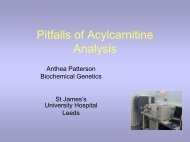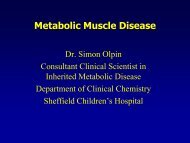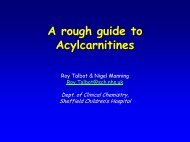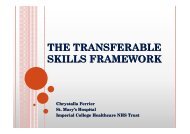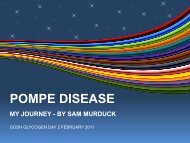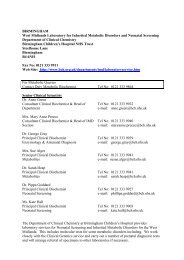The National Metabolic Biochemistry Network - MetBio.Net
The National Metabolic Biochemistry Network - MetBio.Net
The National Metabolic Biochemistry Network - MetBio.Net
You also want an ePaper? Increase the reach of your titles
YUMPU automatically turns print PDFs into web optimized ePapers that Google loves.
<strong>The</strong> <strong>National</strong> <strong>Metabolic</strong><strong>Biochemistry</strong> <strong><strong>Net</strong>work</strong>‘A new resource for Clinicians ’Professor Anne GreenLead ScientistRCPCH York April 2006<strong>MetBio</strong><strong>Net</strong>
<strong>Metabolic</strong> <strong>Biochemistry</strong>
Background– Labs facing major growth/developments inInherited <strong>Metabolic</strong> Disorders and NewbornScreening– Services under pressure• increasing workload• demands for new tests• Concerns about robustness of rare, v rare tests– no manpower or training plan(retirements & succession planning)– lack or awareness of issues by others/DH<strong>MetBio</strong><strong>Net</strong>
<strong>The</strong> Project Aims• Form a network of stakeholderlaboratories across UK– Infrastructure for Communication– Promote sharing of information– Promote common practices– Improve service to users<strong>MetBio</strong><strong>Net</strong>
<strong>The</strong> Project Aims• Form a network of stakeholder laboratories acrossUK– Infrastructure for Communication– Promote sharing of information– Promote common practices– Improve service to users• Address key issues– Manpower plan– Training strategy– Service provision for rare disorders– Assay directory– Develop guidelines– Quality initiatives<strong>MetBio</strong><strong>Net</strong>
Genetics Development Project• DH project– Oct 2002 - Oct 2004(extended to April 2006)• Hosted – Birmingham Children’sHospital• Lead Scientist– 0.4 wte– A/C support<strong>MetBio</strong><strong>Net</strong>
<strong>The</strong> Project Outcomes• Form a network of stakeholder laboratories acrossUK– Infrastructure for Communication– Sharing of information– Promote common practices– Improve service to users• Address key issues– Manpower plan– Training strategy– Service provision for rare disorders– Assay directory– Develop guidelines– Quality initiatives<strong>MetBio</strong><strong>Net</strong>
Service to Users• Infrastructure of Labs– Web site www.metbio.net– Contacts<strong>MetBio</strong><strong>Net</strong>
<strong>MetBio</strong><strong>Net</strong> Home Page
View Stakeholder Details
Service to Users• Infrastructure of Labs– Web site– Contacts• Teaching & Education• Trainers• Web resources<strong>MetBio</strong><strong>Net</strong>
Training and Education
Assay Directory• Specialist metabolic tests• Each Laboratory repertoire• Contact details• Specimen needs and transport<strong>MetBio</strong><strong>Net</strong>
<strong>Metabolic</strong> Assay Directory
<strong>Metabolic</strong> Assay Directory - Search
Guidelines• Best practice• DGH ‘problems’• ‘How to investigate’ for ----• Practical• Lead author(s)• Peer review (2)• Lead scientist/Guideline lead - editing<strong>MetBio</strong><strong>Net</strong>
Best Practice Guidelines
Best Practice Guidelines
Best Practice GuidelinesHOW TO INVESTIGATE FOR AN IMD ?• Hypoglycaemia• Hyperammonaemia ( & sample collection )•Seizures• Neonatal Jaundice• Hydrops (Foetal & Neonatal)• Developmental Delay<strong>MetBio</strong><strong>Net</strong>
Background• Developmental Delay5 – 10% childhood populationGlobal delay 1-3 % children < 5 years• Over 200 different biochemicaldisorders associated with DD– many areas of metabolism– large number different tests– complex & expensive<strong>MetBio</strong><strong>Net</strong>
Investigation of IMD• Rare to have isolated DD– IMDs more common with associatedclinical features– DD may precede onset more specificfeatures of the disease– Importance of serial assessment• Which IMDs to consider ?• Which tests to consider ?<strong>MetBio</strong><strong>Net</strong>
Approach to Investigation• No specific clinical findings but– family history– consanguinity– failure to thrive– intermittent/episodic illness<strong>MetBio</strong><strong>Net</strong>
Approach to Investigation• No specific clinical findings but– family history– consanguinity– failure to thrive– intermittent/episodic illness• Specific disorder(s) suspected• Associated clinical findings– Neurological regression– Hypotonia– Seizure disorder– Hepatomegaly(+/- splenomegaly)– Eye signs– Dysmorphism<strong>MetBio</strong><strong>Net</strong>
1st line InvestigationsGlobal delay no associated findingsBLOOD• Lactate• Urate• TSH, freeT4• Urea,Na, K Ca• Ammonia• ALT,ALP, gamma GT,albumin• Creatine kinase• Amino acidsURINE• Amino acids• Organic acids• Glycosaminoglycans<strong>MetBio</strong><strong>Net</strong>
Seizure Disorder• Sulphite ox/Molybdenumcofactor deficiency• Urate (U & P)Sulphite (U)• Biotinidase deficiency• Non ketoticHyperglycinaemia• Creatine deficiency• Biotinidase (P)• Quantitiative AAs (P & CSF)• Creatine/Creatinine (U) &specific metabolites<strong>MetBio</strong><strong>Net</strong>
Associated Clinical Features2nd line Tests to ConsiderHepatomegalyOrotic Acid(+/- Splenomegaly) White Cell EnzymesOligosaccharidesBile AcidsLactate,Chol,TGs,gluc profileDysmorphism<strong>MetBio</strong><strong>Net</strong>VLCFA,plasmalogensWhite Cell Enzymes7- dehydrocholesterolCholesterol precursorsTransferrin isoforms
Associated Clinical Features2nd line Tests to ConsiderHypotoniaVLCFA (P)Biotinidase (P)Purines/PyrimidinesAcyl Carnitines (P)BiopterinsNeurotransmitters<strong>MetBio</strong><strong>Net</strong>
Future Plans• More Guidelines/Dissemination of Guidelines<strong>MetBio</strong><strong>Net</strong>
Guidelines in Progress• SUDI ( <strong>Metabolic</strong> autopsy)• Lactic Acidosis• Liver dysfunction (older child)• Cardiomyopathy• Encephalopathy• Dysmorphism• Autism• Rhabdomyolysis• Unexplained tubular dysfunction<strong>MetBio</strong><strong>Net</strong>
Future Plans• More Guidelines/Dissemination of Guidelines• Assay Directory• Disorder links• Links to UKGTN ( molecular tests)• European links for rarer tests• Service issues– Very rare tests– Specialised skills– Newborn screening– <strong>National</strong> clinical networks ( <strong>National</strong> review)<strong>MetBio</strong><strong>Net</strong>
Summary – <strong>The</strong> Resource• <strong><strong>Net</strong>work</strong> of Labs– Contacts– Test repertoire• Support to clinicians– Assay directory– Guidelineswww.Metbio.net
Acknowledgements•Association of Clinical Biochemists (Training Committee)•Royal College Pathologists (SAC Clin Biochem & Genetics)•British Inherited <strong>Metabolic</strong> Disease Group•Birmingham Children’s Hospital•Genetics colleagues•Department of Health



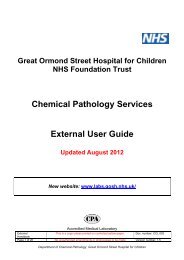
![GSD 14.10.10.ppt [Compatibility Mode] - MetBio.Net](https://img.yumpu.com/49674680/1/190x135/gsd-141010ppt-compatibility-mode-metbionet.jpg?quality=85)
